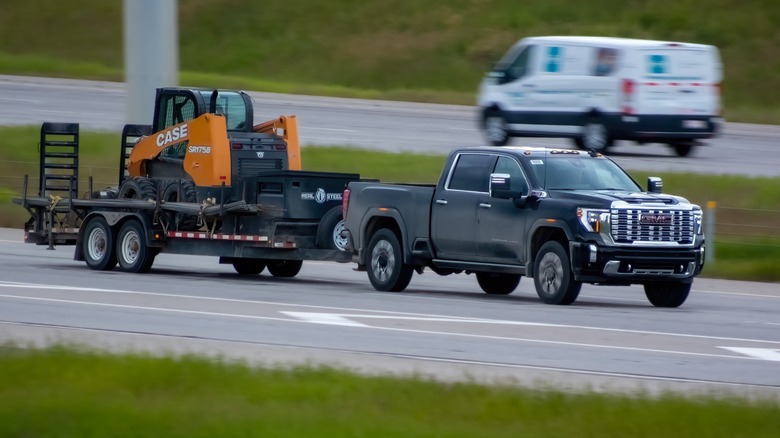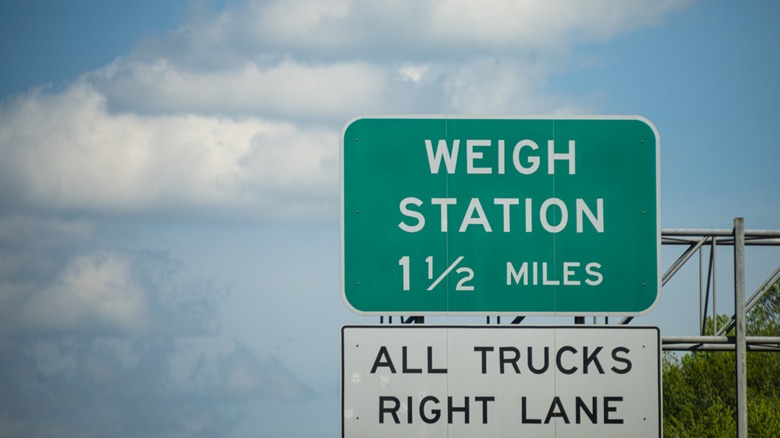Do Pickup Trucks With Trailers Need To Stop At Weigh Stations In California?
Traveling between states comes with the nuisance of needing to know local laws and regulations. Among your responsibilities is knowing whether any of them will directly impact you or your progress along the roadways. For example, if you've ever driven through California, chances are you've likely spotted signs for weigh stations scattered along the highways. As a facility of the California Highway Patrol (CHP), these stations are designed to ensure drivers on California roadways are complying with local safety regulations.
According to the CHP's Basic Inspection of Terminals (BIT) program, the concern is ensuring commercial vehicles are being properly maintained to maximize roadway safety. California's BIT program is what ultimately dictates who needs to enter a weigh station for a proper inspection. Since the determining factor for what types of vehicles need to stop is determined primarily by weight, some drivers may be confused as to whether they'll be going against CHP regulations by skipping the weigh station. For example, a pickup truck with a hitched trailer is quite heavy, but will that need to undergo an inspection? There's also the question of whether there's a difference in regulation for full-sized versus mid-sized pickup trucks.
The short answer is most likely not, but there is one factor you'd need to consider as the vehicle's driver.
Are pickup trucks with trailers subject to California's BIT program?
Too often, the legalese of state or federal government programs is difficult to navigate. In the case of California's BIT program, the specifics are actually laid out fairly clearly, making it easier to determine who is and is not subject to inspections. For a pickup truck traveling with a trailer, there should be no need to stop at a CHP-operated weigh station, so long as that truck isn't being driven commercially.
According to the specifics of CHP's BIT program and the California Vehicle Code (CVC), a pickup truck that is "never operated in commercial use" is excluded from inspection requirements. Per the CHP, a commercial motor truck towing a trailer with a combined gross vehicle weight rating (GVWR) of more than 10,000 pounds and a total length exceeding 40 feet would need to stop at a weigh station. Even though some of the biggest pickup trucks available can weigh as much as 8,000 pounds, and some trailers could have a GVWR of around 2,000 pounds or more, because they're not commercial vehicles, they're not subject to a CHP inspection.
There is one exception to this rule. If a truck meets the specifications of Section 471 of the CVC, which designates pickups as a motor truck with a GVWR of less than 11,500 pounds and an empty weight of 8,001 pounds, but has a utility body, it is no longer considered a pickup and requires inspection.
What is a commercial vehicle, according to CHP?
Typically, a driver knows whether they're driving a commercial or a non-commercial vehicle. However, for the sake of covering all bases and ensuring there are no mixups on California's roadways, it's worth knowing what the state considers to be a commercial vehicle. According to Chapter 13 of the California DMV Vehicle Industry Registration Procedures Manual, a commercial vehicle is defined as one that transports "persons for hire, compensation, or profit" or one that is used "primarily for the transportation of property."
Examples of potential commercial vehicles include multipurpose vehicles and "passenger-type vehicles transporting persons for hire." When not used for a commercial purpose, pickup trucks fall under the blanket title of a passenger vehicle, but, under the right circumstances, can be considered a commercial vehicle. If you're unsure if your pickup and trailer qualify as commercial use and need to stop at a weigh station, contact CHP before your travels. Failing to comply with BIT program regulations is a misdemeanor, which could result in a $1,000 fine and, in unlikely cases, jail time.


